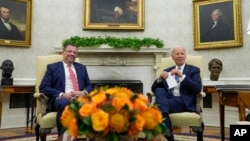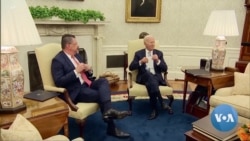President Joe Biden met with Costa Rica’s leader Tuesday to talk about concerns near and far, including the toll that irregular migration is taking on the small Central American nation and the challenges posed by China’s increased global ambitions, which rely on semiconductors.
Biden was quick to praise the relationship the U.S. and Costa Rica have built in the past year.
"Just over a year ago in California, we stood together with partners across the region for the Los Angeles Declaration on Migration and Protection," Biden said from the Oval Office, where he met with Costa Rican President Rodrigo Chaves on Tuesday afternoon. "You've done an incredible job since then, been a great partner."
Chaves echoed the warm sentiments.
"Costa Rica has been, and shall remain, one of the strongest allies in the world regarding your economic and security interests that are ours," he said.
The White House says the two nations align ideologically as well.
"Costa Rica has been a regional leader," said White House press secretary Karine Jean-Pierre. "They are a strong democracy with a thriving economy and leading by example on migration management."
The leaders had serious issues to discuss, like the challenges posed by a flood of migrants streaming through Costa Rica en route to the U.S. Earlier in the year, Chaves said his nation needed help.
"What we have to do is to ask countries like the United States to help us to fulfill what we want: to be good international citizens, good citizens of the world, a country that continues to be generous, but the costs are becoming immense," he said. "Let there be clearer signals in the United States."
And analysts say the small coastal nation – famed for its beaches and biodiversity – also has a role to play in countering China’s economic ambitions.
A program funded by Biden's 2022 CHIPS and Science Act, which aims to counter China, is looking to Costa Rica as a partner in the manufacture of semiconductors: the chips so small they measure in nanometers but that power machines that can fly to the moon.
"Recently, the United States announced that Costa Rica would receive funds from the so-called ‘ITSI’ Fund, which is part of the CHIPS and Science Act, to help it build out some parts of its semiconductor supply chains," said Ryan Berg, director of the Americas Program at the Center for Strategic and International Studies.
He noted that Costa Rica is not new to the industry.
"Intel, specifically, has an operation in Costa Rica," he said. “So we're not trying to build something from scratch. There is a foundation there to build on. And I think much of the proof will be in the pudding of the actual training programs themselves, whether Costa Rica can build out the human capital to attract more spending in that space."






